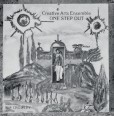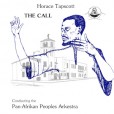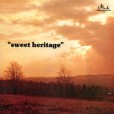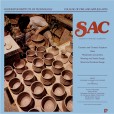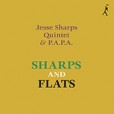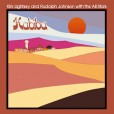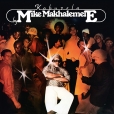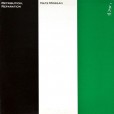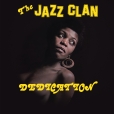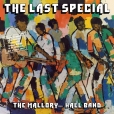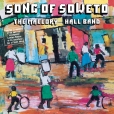Your basket is empty

Mr. Circle
Thi Nam
Outernational Sounds
Originally released in 1981, Mr. Circle’s Thi Nam should really have been recognised decades ago as a jazz dance classic. A beautiful example of European jazz fusion at its most sophisticated and optimistic, the album is immersed in the sonics and rhythms of pan-Latin fusion and Brazilian samba, but with one foot in the upful jazz fusion exemplified by Roy Ayers or the Mighty Ryeders.
Taking inspiration from Ursula Dudziak, Flora Purim, and Norma Winstone, singer Monika Linges uses the crystalline tone of her voice as an instrument within the ensemble. The LP is built around the interaction of her vocalising with bandleader Mikesch van Grümmer’s keyboard versatility, all underpinned by the surging Brazilian rhythms laid down by drummer Gerd Breuer and percussionist Ponda O’Bryan.
The result is a unique set of sunlit, Brazilian-inspired jazz fusion. Aimed squarely at the feet throughout, the album kicks off with a double whammy: the funky title track, followed by. the percussion-rich Juntos. The long form Suka begins with a shimmering intro before taking flight halfway through into an urgent jazz samba with Linges’ vocals to the fore. Featuring the vocals of Bill Ramsay, Tides is another driving jazz-dancer with a Brazilian twist, while the summery, propulsive Schoch-Schach features virtuosic interplay between Linges and alto saxophone.
Another key document of the Los Angeles radical jazz underground, by way of Outernational Sounds.
A tour de force of spiritually energised independent jazz music, this is pianist and composer Kaeef Ruzadun Ali’s debut recording as leader of the Creative Arts Ensemble, as it emerged from Horace Tapscott’s legendary Pan Afrikan Peoples Arkestra,
PAPA mainstays like reedsman Dadisi Komolafe, drummer Woody ‘Sonship’ Theus and altoist Gary Bias are here; besides such veterans as Henry ‘The Skipper’ Franklin on bass, and George Bohannon on trombone. Kaeef’s sister B.J. Crowley provides visionary, sanctified singing.
Classic spiritual jazz, available again as an LP for the first time since 1981; with the recordings at full length on vinyl for the first time ever.
Available on vinyl for the first time in forty years, Horace Tapscott’s burning, spiritualised 1978 set is a masterpiece of the Los Angeles jazz underground.
It’s drawn from two studio sessions in April 1978, one at Hollywood Sage and Sound, one at United Western. The latter session added a string section, which can be heard on the moody Cal Massey composition Nakatini Suite and Jesse Sharps’ swinging modal trip Peyote Song No. III, with its swirling soprano solo. In keeping with the communal nature of the Arkestra, the other two compositions, The Call and Quagmire Manor at Five A.M. are also by Arkestra members. But at the centre of the music is the builder of the Ark, the visionary whose original call to action started a movement whose legacy continues to this day — Horace Tapscott.
180g audiophile vinyl in a painstakingly reproduced sleeve.
Heed The Call!
The pianist James Edward Manuel’s only release is one of the deepest custom-press jazz recordings of them all.
Jaman studied under greats like Earl Bostic and Horace Parlan. Gigging on the Buffalo club scene, one of his early trios included the renowned bassist John Heard and drummer Clarence Becton, till both were poached one night by a visiting Jon Hendricks. Other sidemen include Sun Ra Arkestra bassist Juini Booth and Ahmad Jamal regular Sabu Adeyola (also of Kamal & The Brothers).
Pressed in tiny quantities by the Mark Records custom service in 1974, and issued with a stock landscape cover, Sweet Heritage presents a soulful mixture of covers and originals. In particular the flying, spiritual sound of Free Will and the upful, Latin-tinged In The Fall Of The Year — both Jaman compositions — have turned the LP into a legendary collector’s classic.
Organically funky, laced with avant-garde synth textures, and studded with breakbeats, the second Outernational is Jeff Resnick’s unique, ultra-rare, 1978 promotional recording for the School for American Craftsmen, at the Rochester Institute of Technology. Five tracks of soul jazz and modal fusion — re-modelling Trane, and opening with a variation of Norwegian Wood — by a local group including trumpeter Jeff Tyzik and pianist Sonny Kompanek; then Resnick mostly solo for the second side, when the money ran out, multi-tracking synthesizers on his home set-up, in an engrossing blend of reflective abstraction, grooving electro and spiritualised fourth-world tropicalism.
Bim!
The saxophonist Jesse Sharps took over from Arthur Blythe as leader of Horace Tapscott’s Pan-Afrikan People’s Arkestra. ‘He became the Ark leader…he was hardcore,’ the pianist recalls. ‘They’d all be quiet and listen to him when he talked.’
This was the period of such classic PAPA recordings as Flight 17, Live At IUCC and The Call; lit up by the funky, deep spirituality of Sharps compositions like Desert Fairy Princess, Macramé and Peyote Song II.
His own Sharps And Flats album was recorded in 1985 for Tom Albach’s legendary Nimbus West imprint, adding a stunning sixteen-minute bonus cut by the Pan-Afrikan Peoples Arkestra, featuring Horace Tapscott, recorded in 1979.
A lost classic of the Los Angeles jazz underground, on wax at last!
Originally released by Gallo in 1974, this is a raw, impassioned, stunning set led by bop pianist Kirk Lightsey (a regular sideman for Chet Baker) and saxophonist Rudolph Johnson (from Black Jazz), on a break from touring South Africa with Detroit crooner Lovelace Watkins.
A heavy-duty excursion into post-Coltrane spiritual modernism, ranging from the modal, cerebral intensity of the side-long title track Habiba, to the downhome breakbeat groove of There It Is, and the dark glitter of minor-key waltz Fresh Air. Long one of the most desired global jazz LPs, and never before available outside South Africa, Habiba is a forgotten masterpiece of its era.
Calling all Disco Freaks!
‘The great South African tenorist Mike Makhamalele was a graduate of the key early-seventies group The Drive (alongside Bheki Mseleku and Kaya Mahlangu); and a mainstay of the scene centred on the Pelican nightclub in Soweto. From 1975, he began to record under his own name, developing a sophisticated fusion sound in a musical lane which few of his contemporaries were travelling.
‘Always attuned to other global fashions in Black dance and pop music, under numerous studio aliases he cut 45rpm covers of Fela’s Shakara and the Sugar Hill Gang’s Rapper’s Delight; and in 1979 he entered the Gallo studios with producer Peter Ceronio to respond to the ascendant sound of disco. Named after a township dance craze, Kabuzela was the result: four extended tracks of bouncing, upful disco jazz. Perfectly calibrated for dancing, heavy on the bass and drums, the album is set off by a gleaming centre piece, Disco Freaks — a joyous paean to the weekend and true lost gem of global disco, perfect for the most discerning dancefloors.’
A core member of the circle around Horace Tapscott, pianist Nate Morgan was a key member of the Pan Afrikan People’s Arkestra, known as The Ark.
Here is the second of his two LPs for Nimbus West. His first, Journey Into Nigritia had been a declaration of arrival laced with energies drawn from Cecil Taylor and Coltrane. One year later, in 1984, with nods to Herbie Hancock (One Finger Snap) and Ellington (Come Sunday), Retribution, Reparation was a confident statement of purpose. Politically charged with pan-Africanist Black nationalism, and titled with uncompromising directness, the album focusses the soundworld of the Ark into a surging, restless masterpiece of spiritualised modal jazz.
Danny Cortez on trumpet and Jesse Sharps on saxophones comprise an explosive frontline. Fritz Wise and Ark regular Joel Ector hold down the rhythm section. Morgan’s forceful, Tyner-like chords and virtuosic solos bind the music together.
From the poised drama of the opening dedication to Tapscott’s U.G.M.A.A. organisation, through the propulsive militancy of the title track, Retribution, Reparation spreads the word: ‘Advance to Victory, Let Nigritia Be Free!’
‘One of the best, rarest and most sought after South African recordings of the early 1970s, available again for the first time since its original South African release — the tough, jubilantly swinging township groove of The Jazz Clan’s 1973 debut LP, Dedication. It captures the acoustic jazz sound of the early 1970s in its pomp — a handful of tightly wound songs jostling for space, blending uptempo soul-jazz sensibilities with Latin influences and pronounced township jazz accents, the latter especially audible in Dimpie Tshabalala’s piano vamps, Jeff Mpete’s pattering hi-hat emphases, and the unmistakably South African swagger and dip of the horns on cuts like Rabothata. It is music on the brink of a transition, looking ahead but still dedicated to the sound of the golden years, and it could have been made nowhere else on earth but in Soweto.’
Blue Mabone!
Like The Last Special, this was recorded at Johannesburg’s Video Sounds Studios in December 1974, in the depths of the apartheid era, by a twelve-piece touring band from California which immediately moved beyond the segregated hotels and ballrooms to build links with local South African players and audiences.
Featuring pianist Kirk ‘Habiba’ Lightsey, Rudolph Johnson from Black Jazz, and Billy Brooks, both records are superbly arranged slabs of peak 1970s funky big-band soul jazz, with tasteful Latin inflections and more than a nod to South Africa’s upful township jazz sound.
Try Hamba Samba!

